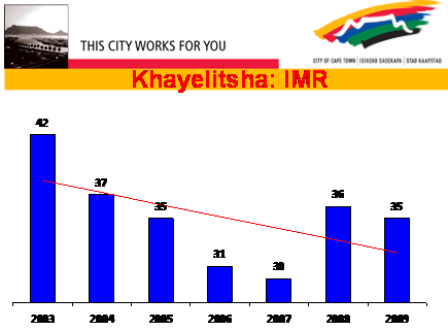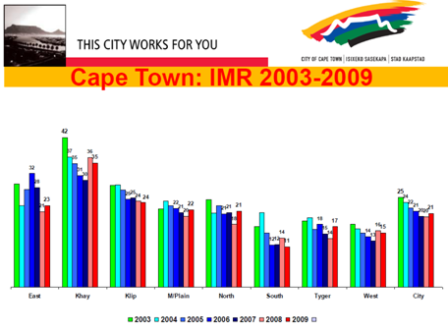Is the DA telling a true story about infant mortality?
The Democratic Alliance (DA) has released a report titled The Cape Town Story. It makes a strong case that before the DA took over Cape Town in April 2006, the city was ineptly run. The DA has turned things around. "The City of Cape Town has delivered a better life for all," it says. The press statement accompanying the report's release states, "The people of Cape Town already know much of the Cape Town Story. They know the difference that DA government has made in their lives. That is why they gave us an outright majority in the 2009 provincial election." It goes on, "Cape Town is today recognised as the best performing metro in the country."
On the face of it, it's all plausible. Who can honestly deny that the city was poorly administrated under the ANC? And who can deny the DA's commitment to stamping out corruption and good governance? It's not surprising that journalists and academics have for the most part been uncritical of the DA's claims. The ANC has become so complacent that its propaganda machine is unable to spot when the official opposition is being more than a touch frugal with the truth.
We will not comment on all the claims made in the Cape Town Story, many of which need to be further scrutinised. We will focus on what is arguably one of the most important measures of whether socio-economic conditions are improving: infant mortality.
The press statement claims that "the DA has improved public healthcare, cutting the infant mortality rate from 25.2 in 2003 to 20.8 in 2009 and achieving an 80% TB cure rate, the highest in the country." The Cape Town Story states, "The City's Infant Mortality Rate improved from 25.2 in 2003 to 20.8 in 2009, in a context where the national rate has declined (to about 50)."
It would have been nice if a primary source for such an important claim was supplied in The Story of Cape Town. But unfortunately, the reference is to a speech by James Vos, chair of the health portfolio committee on 4 January 2011. We cannot find the speech online.
This infant mortality statistic appears to be a misrepresentation. It's probably not an outright lie; it's just fails to tell the story properly. It's more like a politician's lie. And properly told, the publicly available data we have, which is from the City of Cape Town, shows that the DA definitely cannot claim responsibility for a decline in child mortality in the city, and may in fact have some explaining to do.
According to data presented by the City of Cape Town in November 2010, infant mortality in Khayelitsha - the City's poorest and largest township - dropped from 42 per 1,000 in 2003 to 35 in 2009. But it also shows that in the year the DA took over the city in 2006, infant mortality had already dropped to 31. It then dropped a little more in 2007 but then increased to 35 in 2009. This tells the opposite story to that of the DA's. See Figure 1.

Figure One: IMR in Khayelitsha 2003-2009. Source: City of Cape Town.
HIV has played havoc with infant mortality. The introduction of mother-to-child transmission prevention and antiretroviral treatment were the likely causes of the drop in infant mortality from 2003 to 2007. But other data from the City of Cape Town shows that it is gastric diseases, not HIV which has caused the recent spike in mortality in Khayelitsha.

Figure two: Gastric diseases are becoming a bigger cause of death. AIDS is declining. It is possible there is a link between the two. Source: City of Cape Town.
What is causing this is uncertain. It is not implausible that it points to poorly maintained and ageing sanitation infrastructure in Khayelitsha, which is a local government responsibility, Another speculation is that statistics gathering in the city is inconsistent and we actually cannot compare data between years. It might even be an insignificant random fluctuation. But whatever it is, it unequivocally does not follow from it that infant mortality in Cape Town has decreased.
We also have not seen data aggregated for the whole city, but Khayelitsha is arguably a fair indicator given its large size and that it carries Cape Town's major burden of disease.
We cannot attribute the spike in Khayelitsha infant mortality to the DA. It might have happened under any government. This needs further investigation. But the DA cannot, according to the data we've seen, claim to have turned around infant mortality. On the contrary it at least has to try to answer why infant mortality has spiked in Khayelitsha since it took power. A spike in infant mortality is so serious that it should result in an official investigation.
If the Cape Town Story has misrepresented this important statistic, it brings into question what other areas in the report may be misrepresented. Hopefuly this analysis convinces newspapers and magazines to get their journalists to scrutinise the entire report very closely.
Postcript
Since publishing in the Cape Times we have researched further. Here is a graph from the City of Cape Town which breaks down infant mortality by district and the entire city.

Figure three: Infant mortality by district and the entire city. Source: City of Cape Town.
If our understanding is correct, the first eight sets of graphs are infant mortality for each of Cape Town's eight districts and the last set is the infant mortality for the entire city.
Infant mortality for the city is the same in 2006, the year the DA took power, and in 2009: 21 per 1,000. There was a decline from 2003 to 2007 from 25 to 20 but this appears to have stabilised. Khayelitsha shows a concerning spike. There is possibly too little data here to draw any hard conclusions.
But there is no way that this data indicates an improvement in infant mortality under the DA.
For much of the last decade, there have been excellent people trying to improve health in Cape Town, including (to list a few) Virginia Azevedo, the late Ivan Toms, the staff of Medecins Sans Frontieres and the various city health facilities, researchers in public health at the three major universities and the members of TAC Khayelitsha (who distribute thousands of condoms monthly). They have worked under both DA and ANC governments. Whatever achievements have been made -and there have been considerable ones-- the kudos belong to them, not to any one political party.
Finally, we have been criticised for pointing out the DA's faults and not the ANC's ones. Our track records criticising the national government over the last decade show this criticism to be ridiculous. Nevertheless we work in Cape Town and this city's government is a DA one. We hold it to account as we would hold an ANC one to account. We hope that in responding to us, the DA will admit its error and not react with irrelevant defensiveness.
Nathan Geffen is TAC Treasurer and Gavin Silber SJC Co-ordinator. This is an extended version of an article that appeared in the Cape Times on 31 March 2011
Click here to sign up to receive our free daily headline email newsletter

